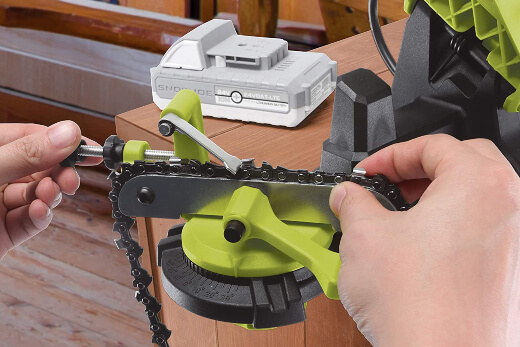If you own a landscaping business or like to trim your own trees, you probably have a chainsaw or mini chainsaw in your garden shed. These tools need to be keep a razor sharp edge to cut through wood cleanly and easily, prolonging the lifespan of your chainsaw and making it safer to use.
We have reviewed what we believe are the best chainsaw sharpeners on the Australian market in 2024. We have selected a range of the best electric and manual chainsaw chain sharpeners, have a read to find the best product for your budget.
More...
Top Pick

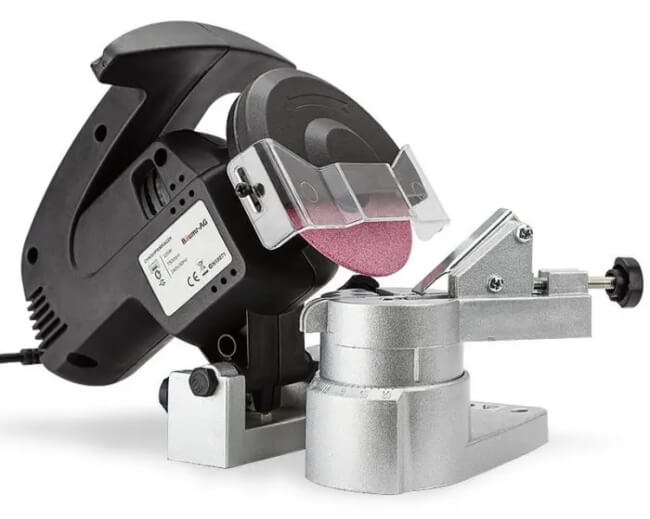
Best Value

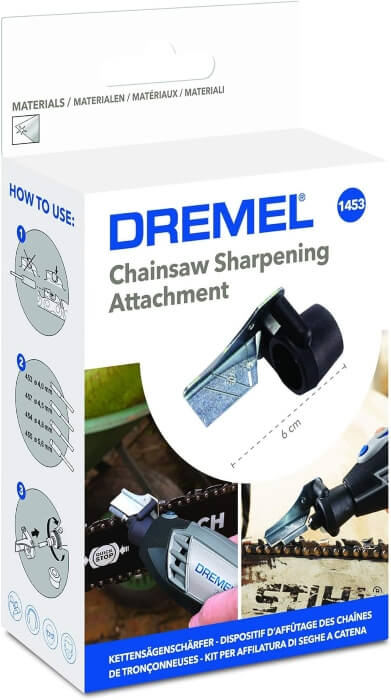
Product | Our Rating | Price | |
|---|---|---|---|
1. Baumr-AG Pro Chainsaw Sharpener and Grinder |  |  | |
2. Dremel 1453 Chainsaw Sharpening Kit | 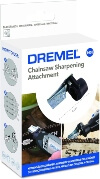 |  | |
3. Alloy Bench Mount Electric Chainsaw Sharpener | 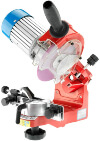 | ||
4. Baumr-AG Pro-Series Chainsaw Sharpener | 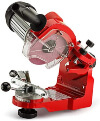 | ||
5. EzzDoo Electric Chainsaw Sharpener Kit |  | ||
6. Oregon Universal Chainsaw Field Sharpening Kit |  | ||
7. Dynamic Power GN-FY220B |  |
Chainsaw Sharpener Reviews
Want the best chainsaw sharpener for your money? Take a look at our reviews.
1. Baumr-AG Pro Chainsaw Sharpener and Grinder

This light weight, but high powered, precision chainsaw sharpener from Baumr-AG is a huge step away from the industrial feel of the tools we’re more used to from this popular brand.
The more streamlined look and feel, makes this chainsaw sharpener a true pleasure to use, and the whole set up is beautifully considered and perfectly constructed.
You even get four bonus grinding wheels supplied with this sturdy and stable chainsaw sharpener, so it’ll keep your chains going for as long as possible, and take the effort out of that maintenance along the way.
Pros
Cons
2. Dremel 1453 Chainsaw Sharpening Kit

This chainsaw sharpener does rely on having a Dremel already, but if you don’t have one, there are few better brands for universal rotary tools, and they are capable of some of the biggest, and finest detail jobs you can imagine.
If you can’t tell, I rely on my Dremel for about 90% of my work, at least when it comes to finishing and polishing. This attachment fits any corded or cordless Dremel, and makes sharpening chainsaws child’s play. Just snap it in, and get grinding.
Pros
Cons
3. Alloy Bench Mount Electric Chainsaw Sharpener

Another good option is this bench mount electric chainsaw sharpener. It offers exceptionally precise filing and has a 250mm maximum cutting length as well as 35-degree working angles and adjustable filing depth.
It has an ergonomically-designed handle and a useful protective cover. It cannot be mounted to a wall, so you’ll need the bench space for this tool.
Pros
Cons
4. Baumr-AG Commercial Electric Chainsaw Sharpener and Grinder
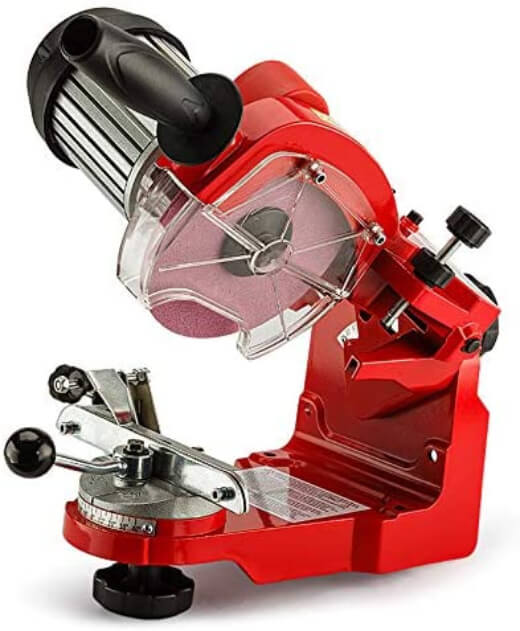
Baumr-AG’s disc grinding chainsaw sharpener is a pretty outstanding bit of kit. It’s not their most advanced, but it’s affordable, durable, and will quite literally last a lifetime.
The biggest bonus is simple though. It just saves you time. This fast-action chainsaw sharpener is safe for its user, easy to mount, and doesn’t wobble at all.
The grinder comes with three sharpening blades that are easy to replace. For commercial chainsaw users, this is ideal, but it’s a great tool to have if you’re serious about taking care of your own trees or managing any sort of woodland at home.
Pros
Cons
5. EzzDoo Electric Chainsaw Sharpener Kit
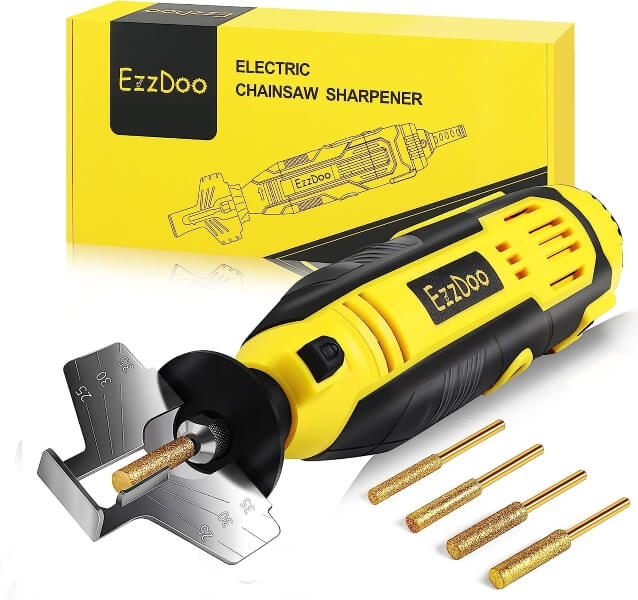
EzzDoo’s handheld chainsaw sharpener comes with four sharpening wheels in different sizes, making it virtually universal. The guide plate makes it incredibly intuitive to sharpen your chainsaw chain, even if you’ve never done it before, and the titanium-plated wheels just last and last.
It’s not just effective either, it’s incredibly good value to boot, offering similar results to chainsaw sharpeners twice its price.
If you don’t like the idea of a large worktop chainsaw sharpener or don’t use your chainsaw that often, it’s well worth considering something a little more compact like this chainsaw chain sharpener from EzzDoo.
Pros
Cons
6. Oregon Universal Chainsaw Field Sharpening Kit
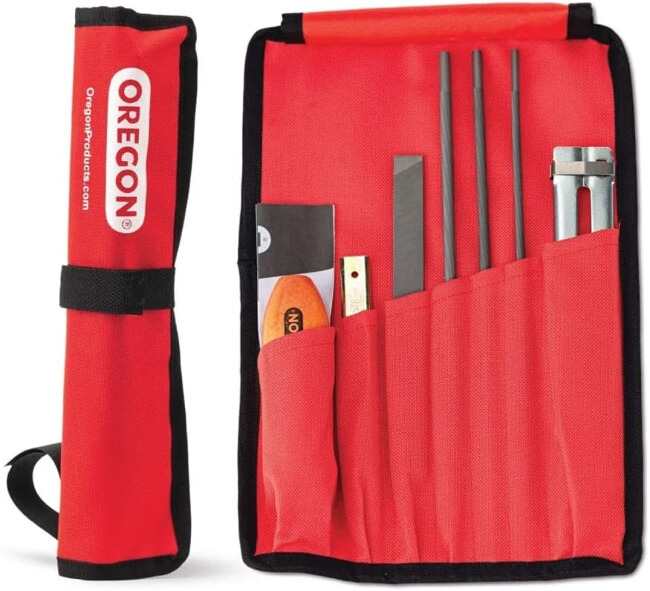
If you’re after something a bit more Heath Robinson, then this simple chainsaw sharpening kit is probably for you. It’s incredibly easy to use, takes up no space in the garage, and while it’s slow, it gives you far more control of the links you’re sharpening, and how deep to cut.
Not all of us have the space for worktop-mounted tools for every purpose, so this toolbox-ready sharpening kit is a great option for anyone who needs to sharpen chain saws but doesn’t have the space for bigger machines.
Pros
Cons
7. Dynamic Power GN-FY220B
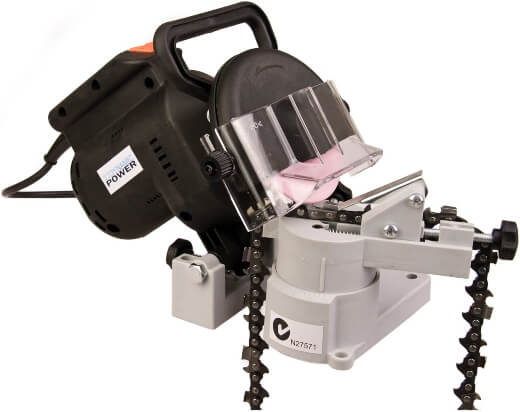
With a powerful commercial-grade motor, this electric chainsaw sharpener is ideal for anyone who needs to use a chainsaw on a regular basis. It’s bench mounted with a rigid CAD-designed body and the motor supplies a constant 7000 RPM without getting hot, so you never burn or soften your chain.
With precise grinding every time and the ability to sharpen all chain types and sizes with ease, this is a powerful and durable sharpener that weighs just 1.95kgs.
Pros
Cons
Chainsaw Sharpener Top Picks for 2024
Chainsaw Sharpener Top Pick


The Baumr-AG Pro Chainsaw Sharpener and Grinder stands out as our top pick for 2024. Its streamlined design, and lightweight body make it beautiful to use, with tidy attachments, and four free grinding wheels to boot.
If you’re after a pro quality grinding wheel in a DIY price range, this is the chainsaw sharpener for you. Plus, its universal bench fittings mean you can use it anywhere and everywhere you need it.
Best Value Chainsaw Sharpener


Value isn’t just about cost, it’s about practicalities too. So our best budget chainsaw sharpener might not be the cheapest in the range, but it’s certainly one of our favourites, and will save you space, and money in the long run.
The Dremel 1453 Chainsaw Sharpening Kit is wonderfully compact, and straightforward to use, making the complicated task of sharpening your chainsaw a walk in the park.
Why Use a Chainsaw Sharpener?

There are plenty of good reasons to invest in a chainsaw blade sharpener:
- Reduced wear – A dull chainsaw will wear out much faster than one that’s kept sharp, because the motor has to work much harder to cut through wood. Regularly sharpening your chainsaw will help this expensive tool last longer with less maintenance.
- Reduced fuel consumption – Because the motor of a chainsaw has to work much harder when the chain is blunt, you’ll use much more fuel (whether it’s petrol or electricity) to get the job done.
- Increased safety – A blunt chain is more likely to cause an injury or property damage, and can slip out of control or break when it encounters very dense materials.
Do Chainsaw Sharpeners Really Work?
Blade sharpeners work very well – but only if you buy a good quality product. They are quick and easy to use, saving you the expense of having to buy a new chainsaw chain when yours gets dull, and it ensures you get a clean cut every time.
How do Chain Sharpeners Work?
The chain of your chainsaw will fit into a horizontal guide on the base of the sharpener. Using a disk-shaped grinding stone (this looks like a circular saw blade with no teeth) on an adjustable head, the chain is guided through the system and filed down at the correct angle.
(Speaking of circular saws, don't miss our product review and buying guide for the best circular saws available in Australia.)
You will have to set the correct angles of the grinding head for your specific chain. The process of sharpening the chain takes just a few minutes.
Different Types of Chainsaw Sharpeners
There are two types of chainsaw sharpener, each with their pros and cons:
Manual Chainsaw Sharpeners
Manual chain sharpeners work well and are affordably priced, but they are less powerful. This means that you can’t take off as much with each stroke, so it’s a bit more challenging to get the chain nice and sharp and make it last as long as possible.
Electric Chainsaw Sharpeners
Electric chain sharpeners work very well and are very powerful, restoring your chain to as-new condition with very little effort. However, they are usually more expensive and you do have to be careful not to overdo your sharpening, as you can end up filing the cutters too low.
What to Look for in a Chainsaw Sharpener
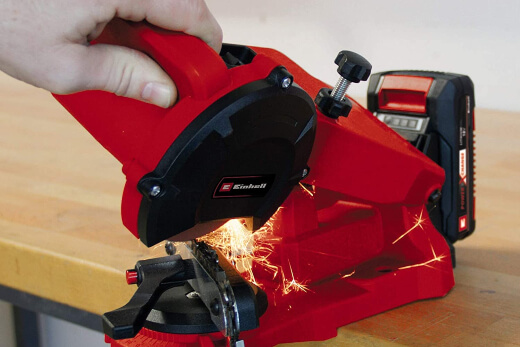
- Mounting – They can be mounted to a wall for easy access, which is a great option if you don’t have much space in your workshop. Bench-mounted sharpeners are workable if you have a more spacious setup.
- Manual or hydraulic assist – Some of the more advanced sharpeners have a hydraulic assist feature that locks the chain in place to prevent it from moving when the grinding wheel makes contact.
It’s not an essential feature but it’s nice to have if you want the process to be faster. Those without it will have a manual assist feature where you tighten a knob to hold the chain in place. - Speed – The more powerful the motor, the higher the rotations per minute (RPM) of the grinding stone. A higher RPM means the job will be completed faster, but it also means the tool is more aggressive, so it’s easier to over-file your chain. A good benchmark is to aim for a sharpener offering around 3400 RPM.
- Pitch compatibility – Pitch refers to the distance between the cutting links on your chainsaw chain. Your sharpener will have to be able to work with the type of chain you have, and most have settings to accommodate different chain pitches. You can usually find your chain’s pitch on the saw arm of the tool.
- Automation – Fully mechanical chainsaw sharpeners require you to unlock and feed each chain link after filing, which can be a bit of an annoying process. Today, you can find sharpeners that fully automate this process – all you have to do is set the adjustments for your chain and let it work.
- Accessories – Today, many come with additional accessories that can be useful depending on how you use your chainsaw. This includes built-in lighting, additional grinding wheels, grinding stones, dressing stones and wheel gauges.
How to Sharpen a Chainsaw Chain
If you’ve never sharpened a chainsaw before there are a lot of potential mistakes you can make, so we’re going to quickly run through how to use a basic chainsaw sharpener, like the manual chainsaw sharpeners in the reviews here.
Once you’ve mastered manual chainsaw sharpeners, the principles are generally the same for electric chainsaw sharpeners.
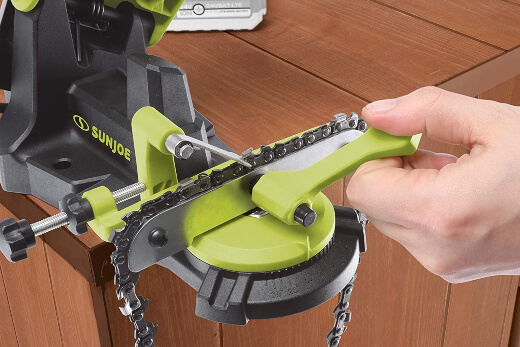
To sharpen a chainsaw:
1. Clamp the blade (bar) or your chainsaw onto a solid surface that won’t move.
a. Use a really good quality vice for this, as it’s essential that your chainsaw is completely still for the next step.
b. It’s fine to clamp your chainsaw upside down if it sits easier on the work surface.
2. Tighten the chain on your chainsaw, making sure it is as tense as possible while still able to move around the saw when pushed.
a. Test that your chain is tight by pushing it (wearing gloves) while the machine is powered off. If it moves slightly, but with effort, it is perfect for sharpening.
3. Before you start sharpening, mark one tooth with a bright marker (this shows you where to stop later).
a. Some chainsaws have an odd coloured link in the chain. If you don’t want to mark your blade, start from this link.
4. Mount your sharpener so that the filing edge is lined up with the direction of the original chain’s cutting edge.
a. This is usually about 30 degrees, but it will be fairly obvious.
5. Slide the file, or electric sharpener, forwards, then remove it, replace, and slide forwards again. Never slide backwards.
6. File each cutter ten times until it is sharp.
7. Repeat this on every chain until you get back around the saw to the original marked chain.
Chainsaw Sharpener Frequently Asked Questions
Are chainsaw sharpeners worth it?
A chain sharpener is definitely worth it, and can add at least 30 hours of working time to every chain. Never re-sharpen a chainsaw chain more than ten times as it will eventually weaken the chain, but every sharpening will add three hours of constant sharp cutting to your chain.
How long does it take to sharpen a chainsaw?
Sharpening chainsaws is an essential part of their maintenance, so it’s well worth investing in an electric chainsaw sharpener.
Electric chainsaw sharpeners will save you time in the long run and are well worth the investment. Sharpening chainsaws with an electric chainsaw sharpener will usually take around five to ten minutes.
Manual chainsaw sharpeners take significantly longer to achieve a good finish, so you can expect to take at least twenty minutes to sharpen chainsaws by hand. Remember that every tooth needs ten forward strokes with a clean file.
How often should you sharpen a chainsaw chain?
Chainsaws should be sharpened after every ten uses as an absolute minimum. Regardless of the type of timber you’re sawing, sap, dust and dirt can build up in the chainsaw chain, and when you’re cutting through really tough materials the teeth will wear down much faster than cutting through softer timbers.
Good quality chainsaw chains working on typical use will need sharpening after ten uses, but for heavy work through solid timber - particularly for cutting through trunks - you should really look to sharpen your chainsaw after just one use.
It’s essential to do this to maintain free movement from your chainsaw, and prevent accidents as blunt chainsaw chains can easily bite and jump back.
How long should a chainsaw chain last between sharpening?
A good chainsaw chain should remain sharp for about three hours of constant cutting. For a chainsaw chain used less than once a year, sharpening annually is fine. If you regularly use your chainsaw, sharpen the chain every few weeks.
Why does my chainsaw get dull so quickly?
If you have a good quality machine with a good quality cutting chain and are finding that it’s getting dull quickly, this may be due to cutting technique (putting too steep and angle on the cutters), placing you rakers too far down, touching the ground with the tip of the saw, or cutting very tough or dirty wood.
Are electric chainsaw sharpeners good?
As with most tools, taking the time to do things slowly and precisely by hand is almost always the best route to accuracy, but a electric blade sharpener will cut your working time by more than half.
Is it better to sharpen a chainsaw blade or buy a new one?
Sharpening a chainsaw chain is better for the environment than purchasing new chains every time and will save you money too. By sharpening your chainsaw chain, it will work like new for weeks, if not months, afterward.
How do I know what type of chainsaw sharpener I need?
To choose the correct chainsaw sharpener, you need to check the size of your chain pitch. Larger pitches mean taller teeth, and higher teeth will require larger files.
Most chainsaw sharpeners are universal, but it's always worth checking their chain capacity against your chain pitch.
How many times can you sharpen a chainsaw chain?
Generally, you can sharpen a chainsaw chain 10 times before it needs replacing.
If you think its time for a replacement then check out our in-depth product reviews for the best chainsaw chains for 2024.

Get Ready to Get Sharp with the Best Chainsaw Sharpeners of 2024
If you regularly use a chainsaw, a chainsaw sharpener is an essential tool to have. Not only does it make your chains last longer, but it also lengthens the lifespan of your saw and allows you to work quickly, effectively and safely.
Whether you want the power and convenience of an electric model or the portability of a manual model, you’ll find the right chainsaw model for you in our reviews!
Published on October 18, 2023 by Gary Clarke
Last Updated on January 11, 2024

